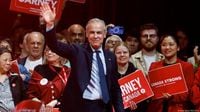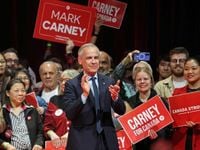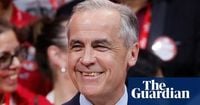Canada's 2025 federal election is being hailed as a game-changer, with the Liberal Party, led by Mark Carney, securing a dramatic victory that underscores the shifting political landscape in the country. Carney, a former central banker who had never held elected office before March 2025, emerged as a formidable candidate against the backdrop of U.S. President Donald Trump's aggressive trade policies and threats to annex Canada.
In his victory speech delivered in Ottawa, Carney expressed a strong resolve, stating, "We are over the shock of the American betrayal; we have to take care of each other. Together we will build a Canada worthy of our values. Canada strong, Canada free, Canada forever, vive le Canada!" His words resonated with supporters, many of whom were motivated by a desire to counter perceived threats from the United States.
The election, held on April 28, 2025, saw the Liberals reclaim their position after trailing significantly in the polls just months prior. Conservative Leader Pierre Poilievre had held a 25-point lead in public opinion surveys as recently as January, but this lead evaporated as Carney's leadership and Trump's continued provocations galvanized Liberal support.
Only four months before the election, Justin Trudeau's resignation had set the stage for a political turnaround. Carney's ascent to leadership coincided with a surge in anti-Trump sentiment among Canadians, particularly as Trump threatened to impose tariffs and suggested that Canada could become the 51st state of the U.S.
Polling data indicated that the Liberals transformed their position from being 20 points behind to overtaking the Conservatives, ultimately securing at least 165 seats in the House of Commons. While it is still unclear if they achieved a majority, the election marks a significant comeback for the Liberals, who last held a majority in 2015.
One of the notable aspects of this election was the record advance voting turnout, with 7.3 million Canadians casting their ballots ahead of election day, up from 5.8 million in 2021. This shift in voting behavior raises questions about the influence of party platforms, as many votes were cast before all parties had released their final policies.
The election also highlighted issues of representation, particularly regarding gender and diversity. Preliminary data showed a decrease in the number of women candidates compared to the previous election, with the NDP fielding the highest proportion of female candidates. However, their significant losses, including Jagmeet Singh's defeat in Burnaby, B.C., and subsequent resignation as party leader, indicate a challenging future for the party.
Polling revealed that young working-class men are increasingly drawn to the Conservative Party, a trend that reflects broader social anxieties about rapid change and economic instability. In contrast, women of all ages continue to favor the more progressive Liberal and NDP platforms.
In the aftermath of the election, discussions have emerged regarding potential reforms to enhance representation in Parliament. Experts argue that a more diverse legislative body could lead to policies that better reflect the population's needs.
As Carney prepares to lead Canada through the complexities of U.S.-Canada relations, his administration faces significant challenges ahead. Trump’s tariffs and threats have already shaken Canadian businesses, pushing the economy towards recession. Carney has pledged to "build things in this country again" to reduce reliance on the U.S. and strengthen Canada’s economic position.
Despite the uncertainties surrounding the Liberal's ability to form a majority government, Carney's victory signals a shift in Canadian politics, with many voters rallying around the idea of standing firm against external pressures. As the dust settles from the election, the implications of this political turnaround will likely be felt for years to come.
In a statement following the election, Carney emphasized the importance of unity, stating, "We have to look out for ourselves. And above all we have to take care of each other." This sentiment captures the essence of the election's outcome, reflecting a desire for a more resilient and self-sufficient Canada in the face of external challenges.
As the new Prime Minister, Carney's next steps will be crucial in navigating the turbulent waters of international relations and domestic policy, particularly in light of the significant changes in voter demographics and preferences that have emerged from this election.






